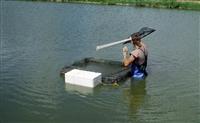Train to Become an Aquaculture Expert with this Certificate in Fish Care and Culture
The course is studied by distance learning and can be started at any time to suit you.
 The fish industry is a billion dollar concern. We eat fish, keep fish as pets, farm fish and more. This course looks at the different areas of the industry, from marine studies to managing aquariums.
The fish industry is a billion dollar concern. We eat fish, keep fish as pets, farm fish and more. This course looks at the different areas of the industry, from marine studies to managing aquariums.
With the successful completion of the Certificate in Fish Care and Culture you will be able to improve your career and job prospects in the fishing industry.
- Start your own business in the fish world.
- Improve your knowledge and skills.
- Study 6 modules covering marine studies, aquarium management, aquaculture and aquaponics.
- Course duration: 600 hours of self paced study.

Modules
Note that each module in the Qualification - Certificate in Fish Care and Culture VEN028 is a short course in its own right, and may be studied separately.
This Course is Relevant to All Form of Aquaculture
Aquaculture is by no means new. People have been growing fish and other things in water for thousands of years. Interest in the subject however, has strengthened both among professionals seeking to farm fish, plants and crustaceans; and among amateurs, sometimes prompted by nothing more than an interest, and sometimes in an effort to become a little more self sufficient.
There are a lot of different terms used to describe growing fish; each with a subtly different connotation.
- Aquaculture is farming fish and other water dwelling plants or animals; in fresh water or salt water.
- Pisciculture is farming fish only (excludes crustaceans, molluscs, seaweed etc)
- Mariculture is aquaculture in saline water
- Aquaponics involves circulating the water from an aquaculture tank, into hydroponic growing systems and back into the aquaculture tank.
- Aquarium management generally refers to growing plants or animals in water as a hobby, or for research or aesthetic purposes
Commercial Aquaculture Systems
Aquaculture systems are generally confined environments; where growing conditions have ben optimised to support more animals in a given space than what might occur in nature. One problem is that when fish (or other animals) are grown at such close quarters, competition can be strong, and often cannibalisation may become an issue.
Commercial systems therefore need to separate small or developing animals from larger ones.
As such, pisciculture systems tend to be one of three types:
- Hatchery Systems that produce fertile eggs, larva or fingerlings
- Nursery Systems that nurse small larvae to fingerlings or juveniles
- Grow-out Systems that grow fingerlings or juveniles to marketable sizes
With all of this growing interest in serious aquaculture; the need for expert advice is greater than ever - whether as a consultant, a writer, educator or something else. This course can open up a wide range of new possibilities for anyone prepared to apply themselves to learn.
How The Course Works
The course can be started at any time. You study by distance learning, so you can study in the comfort of your own home. This doesn't mean you are all alone in your studies; our highly qualified and friendly tutors are there to help you every step of the way. If you have any questions at all, they are always happy to help.
To complete the course, you are required to study 6 modules.
Each module comprises a number of lessons. At the end of each lesson there is an assignment to be submitted to your tutor. At the end of each module, there is also an examination which you can take at a time and location to suit you.
To pass the course you are required to pass all assignments and 6 exams.
If you are not sure about going straight to the certificate, you can study each of the modules mentioned as a standalone course. Please click on the links for more information.
Become an Expert in Aquaculture
If you are interested in studying aquaculture, this is a great starting place.
You might be -
- A complete beginner
- Someone already involved in agriculture or horticulture
- Someone who is interested in keeping fish or already does
- Someone who wants to grow their own vegetables
- Someone who wants to become more self-sufficient or live a more sustainable life
- Anyone interested in fish care and aquaculture
If you are, then this is the course for you.
If you have any questions, our aquaculture tutors are more than happy to help.
